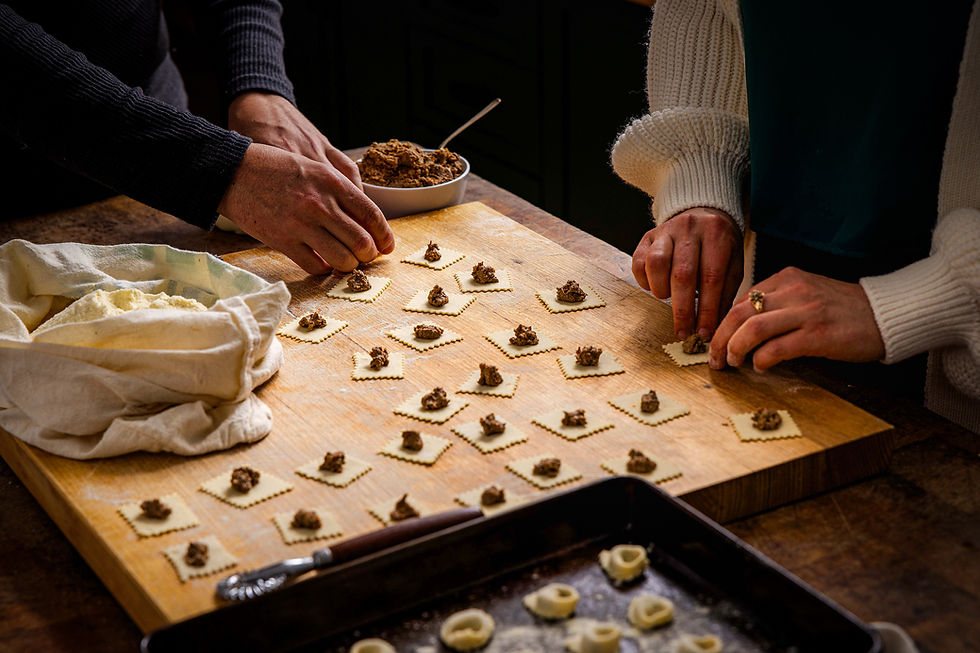The Journey of the Tomato
- Nadia Fragnito

- Feb 24, 2019
- 3 min read
Updated: May 28, 2022
It’s prohibition era. Secret stashes of bottled liquid. Precious cargo hiding in windowless rooms. But this contraband doesn’t involve a single drop of booze.

Passata. You can almost hear me whispering the word, can’t you? Pa-sah-ta. Hidden in tank stands and cellars in neat rows, dark long-neck bottles like vintage wine, ready to be popped open as the star of the show. The liquid within is so superior that it can turn any ordinary meal into a spellbinding dish.

But really, how special can a bottle of squashed tomatoes be? It's probably best you don't know. Because never again will your pasta and pizza be acceptable without this bottled goodness. And to make this precious substance you need to go back to the beginning. It all starts with finding the best quality ripe pomodori.
My father grew tomatoes. Though this is no surprise coming from an Italian culture that is infatuated with fresh produce. However, my dad made a living from it. Or at least tried to in what became a problematic agricultural landscape. In the 1990s there was a monumental shift for tomato growers. Once upon a time the aim was to produce authentic flavourful tomatoes, but sadly, in the search for perfection, the industry expected the growers to produce uniform, tasteless imitations that resembled more apple than tomato. Cue genetic engineering. But in the early days, the tomatoes were good. Garden of Eden good.

I had my taste buds spoiled at a very early age. I can’t recall when I tried my first tomato but I do know it has ruined my ability to enjoy a supermarket tomato ever since. My father built his glasshouses when it was custom to construct them with small squares of glass onto timber frames. Later they were often built with plastic, but the name of glasshouse stuck. When tomatoes were in season, our glasshouses were filled with ground to ceiling twisting vines, greedy drooping leaves and the smell of rich earth. As a little girl, I would run through the rows of vines, playing imaginary games. I took it for granted that I could pick the tomatoes straight off the vine, popping the red fruit into my mouth to feel the skin explode as its contents burst with flavour - tangy and sweet all at once.

Often our whole family was involved in bringing the tomatoes into existence. We’d kneel down in the dusty soil and place tiny seeds or seedlings into a trench. I would always finish planting my row last, with my elder brothers speeding ahead, though not to be outdone by my nonna who never failed to amaze us with a speediness that belied her age. From our glasshouses came the tomatoes and from the tomatoes came the passata.

Ritualistically, Italian families all come together for Tomato Sauce Day: the annual event of prepping, boiling, pressing, bottling, sterilising ripe tomatoes into pureed liquid gold. This event takes place outdoors or in sheds. It’s a big tomatoey mess. Much like squashing grapes in a wine harvest. Traditionally, our family would use a copper pot over a fire to blanch the tomatoes before they were pressed. Tables are set up like a factory production line to send the tomatoes into the heavy duty puree machine for pulping. Next is bottling and sterilising. Don’t forget to push a fresh basil leaf or two into the bottle. But you must have the perfect kind of bottles. These are dark long-neck beer bottles with just the right kind of lip to fit the caps. These bottles are like precious antiques – you don’t ever throw them away. As an adult living interstate, there were several times I stashed these bottles in my luggage to return them home for future sauce making days.

Now living hundreds of miles from my family, far from their secret stashes of passata and homemade produce, I wonder how I can recreate these rituals without compromising on quality. There is a possibility that such traditions will fade into the past. I’m sure you have your own ancestral rituals that are at risk of being lost amid the fast pace of modern life. Perhaps these traditions might feel a little gratuitous. With our supermarket shelves bursting with jars and packets of every possible ingredient, this nostalgic food preparation might seem like an unnecessary process. Modern manufacturing has made the need to preserve your own apricot jam, pickle your own cucumbers and roll your own pasta redundant.
Until you realise, it’s not really the same. That convenience doesn't equate to quality. And this quality comes from more than just opening the lid of a jar. It’s the journey of a tomato. The sweat of the grower. The hands of your grandmother. A recipe created from the pieces of your memory.
That’s the good stuff. You and your food will be all the better for it.






Comments